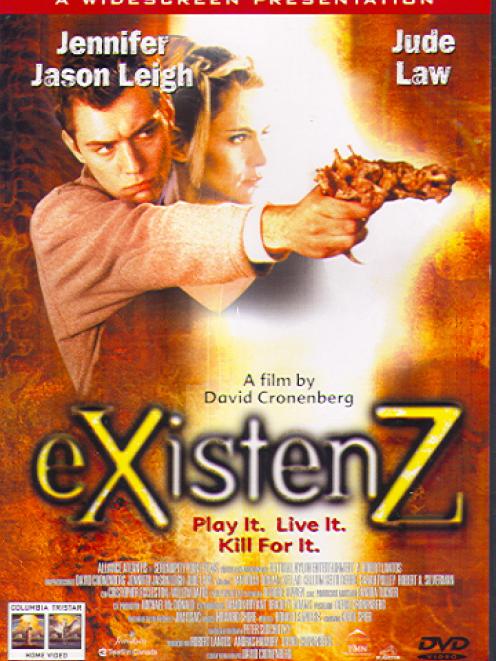
David Cronenberg's psychotropic sci-fi satire eXistenZ found itself in an unenviable position when it premiered in April 1999.
The unfortunate twist of fate that befell the film was that it was released within a hair's breadth of The Matrix, a less impressive but vastly more popular mind-bender about virtual reality and the thin line between perception and hallucination.
While it may have been The Matrix's heady brew of futurist spectacle and pop-philosophy that set the multiplex tills ringing, eXistenZ was the real deal, a darker, deeper and much more trippy journey down the rabbit hole.
The film was the first original script that Cronenberg had written since Videodrome (1981). In the intervening years, he had found raw literary material for his transgressive cinematic fantasies in the likes of William Burroughs' Naked Lunch, David Henry Hwang's M. Butterfly and J.G. Ballard's Crash.
The signature themes of deviant subcultures, artistry as a form of psychosis and the collision between bodies and technology that defined those films are all on display in eXistenZ.
Its unlikely inspiration was an interview that Cronenberg conducted with the author Salman Rushdie, shortly after the Islamic fatwa that sent him into hiding.
Standing in for Rushdie in eXistenZ is Allegra Geller (Jennifer Jason Leigh), the greatest game designer in the world. In the world this film inhabits, games are played in fully immersive virtual realities and gamers are like a cross between born-again Christians and heroin junkies.
As she is unveiling eXistenZ, her latest masterpiece, to a worshipful focus group, Allegra finds herself the victim of an assassination attempt by a member of the Realist underground, a group of militant defenders of everyday reality that see her work as a mortal threat.
As the film progresses, it becomes clear that their position is not entirely unreasonable...
Allegra is rescued by Ted Pikul (Jude Law), a mild-mannered PR nerd cum unarmed security guard, and together they go on the lam, running from mysterious enemies in a state of ever-increasing paranoia.
Allegra is in sole possession of the master game pod - a pulsing, gurgling, bio-technological contraption that looks a little like an over-sized, plasticky placenta - which contains the only existing copy of eXistenZ.
The master-pod has been damaged during the attempt on Allegra's life, and the only way for her to assess the health of her ‘baby' is to enter the virtual world and play with someone friendly.
Once Ted, the virtual reality virgin, has had a ‘bio-port' installed by a deranged mechanic at a country gas station (eXistenZ plugs umbilically into an orifice in the spines of its players), the pair enter Allegra's artificial universe - an unusual place indeed.
On the one hand, the world of eXistenZ offers a powerful antidote to some of reality's more limiting conventions.
"That wasn't me, it was my game character!" Ted protests, after being overcome by a perverse desire to insert his tongue into Allegra's bio-port.
On the other, it contains some un-nerving qualities, such as the recurrence of the themes of war and disease within the game's narrative and the system's ability to override free will of its players when it is necessary to progress the story.
"It's just like real life," Allegra says of the free will problem. "There's just enough to make it interesting."
But the real problem with the game is that it becomes increasingly impossible for Ted and Allegra to determine where the game ends and where reality begins. Are they even real people at all, or merely characters playing a game within a game within a game?
So the film's title offers the best clue to its real intentions: eXistenZ's Twilight Zone, B-movie aesthetic and Hitchcockian twists ultimately give way to a genuine sense of existential dread.
The story is, by turns, spooky, suspenseful, comedic and absurd, but its underplayed assertion that our own world is as confusing, paradoxical and dangerous as its virtual counterpart gives an unusual weight to its horrors.
By way of comparison - watching The Matrix, with its conventional plotline in which freedom fighters expose a dystopian conspiracy, is a little like taking the blue pill.
eXistenZ is the red pill. It invites you to question whether reality itself is anything more than a sprawling, overly complex game, and offers precious little in the way of reassurances.











